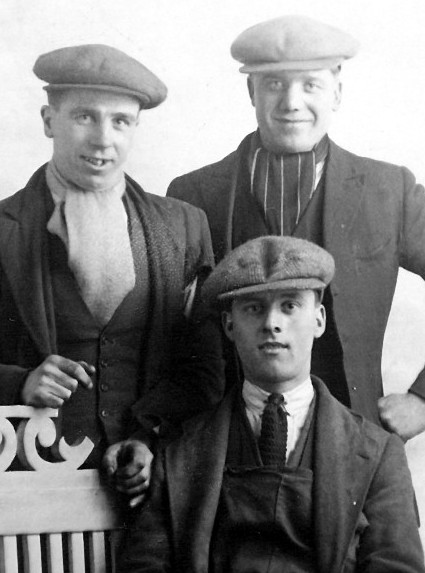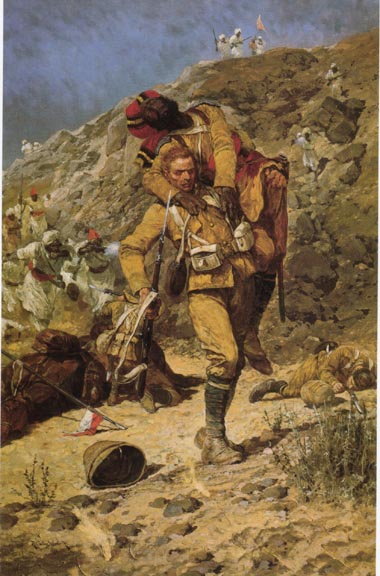 Well, what indeed?
Well, what indeed?He got rubbed out of history as being no longer desirable or fashionable to the modern world.
And who rubbed him out?
His supposed best "comrade", the Socialist Left - that's who!
The Left began by extolling the virtues of the ordinary, working man but all the while they were planning his extinction.
And whenever Marxists took control of the government they literally "rubbed out" millions of ordinary working men and their families by mass slaughter. So much for the great champions of the working class! In reality, Marxism has ever been the darling of the lazy, stupid, prostituted, ne'er-do-well or egoistic members of the middle and upper classes who wanted to pose as salon revolutionaries and champagne Bolsheviks for their chic, rich friends and to climb up the greasy pole by the cheat's quick route rather than by hard work.
But it has ever been the ordinary working man who has had to pay for these revolutionary poseurs and hypocrites - often with his very life.
Now that Marxism and its base and murderous materialism is discredited (despite decades of utter adulation and base grovelling from the media and academics of the free world!) has the working man been restored to his rightful place?
Nope.
Seedy, hedonistic, self-worshipping, atheistic, anti-life Capitalism has swept in to replace the gross materialism of atheistic Marxism with another equally gross materialism. In each case their only god is self and material goods. In each of these loathsome creeds, one's neighbour is merely there to be exploited, used, cheated, defrauded or, if he gets in the way, terminated.
Each creed has one other thing in common. They have successfully abolished the good, old working man and replaced him with something entirely modern, entirely ugly and often grotesque and degraded.
 Phoney, modern "working class" frauds include screaming, rock-ape billionaires like Bruce Springsteen. Working class? Who's he kidding!
Phoney, modern "working class" frauds include screaming, rock-ape billionaires like Bruce Springsteen. Working class? Who's he kidding!The working man has often either been transmogrified into a caricature of himself, "sexed up" to look like some fatuous "pop" star, or forced into a job far more tedious, dreary and soul-destroying than any factory, coal-mine or ship-yard ever was. If that fails, he ends up in the Young Offenders' Institute or prison.
This is apparently called "progressive".
And, of course, if he is white, male and European, he is positively despised by the institutions of modern society whose political correctness has become a new form of neo-Fascism.
But when a war comes and the government needs someone to fight it, to whom do they go? Yep, the ordinary, working man, again. Old Tommy gets pushed to centre stage again. And when the war's over, he's forgotten again.
Or, if the government is New Labour, he doesn't even get remembered while he is actually fighting the war! Instead, he is forced to make do with out of date equipment, poor conditions and weapons and a black bag and a few quid for his wife and family back home, if he is killed!
Note well, ladies and gentlemen! Note well. This is a supposedly "Labour" government that is doing this to our boys at the front. "Labour"? Who are they kidding? They would not know a labouring man if he rose up before their very eyes and punched them on the nose!
Kipling, as ever, understood it well:
By Rudyard Kipling, 1892
I went into a public- 'ouse to get a pint o' beer,
The publican 'e up an sez, "We serve no red-coats here."
The girls behind the bar they laughed an' giggled fit to die,
I outs into the street again an' to myself sez I:
O it's Tommy this, an' Tommy that, an' "Tommy go away";
But it's "Thank you, Mister Atkins," when the band begins to play-
The band begins to play, my boys, the band begins to play,
O it's "Thank you Mr Atkins," when the band begins to play.
I went into a theatre as sober as could be,
They gave a drunk civilian room, but 'adn't none for me;
They sent me to the gallery or round the music-'alls,
But when it comes to fighting', Lord! They'll shove me in the stalls!
For it's Tommy this, an' Tommy that, an' "Tommy wait outside";
But it's "Special train for Atkins," when the trooper's on the tide-
The troopship's on the tide, my boys, the troopship's on the tide,
O it's "Special train for Atkins," when the trooper's on the tide.
Yes, makin' mock o' uniforms that guard you while you sleep
Is cheaper than them uniforms, an' they're starvation cheap;
An' hustlin' drunken soldiers when they're goin' large a bit
Is five times better business than paradin' in full kit.
Then it's Tommy this, an' Tommy that, an' "Tommy 'ow's yer soul?"
But it's "Thin red line of 'eroes" when the drums begin to roll-
The drums begin to roll, my boys, the drums begin to roll,
O it's " Thin red line of 'eroes," when the drums begin to roll.
We aren't no thin red 'eroes, nor we aren't no blackguards too,
But single men in barricks, most remarkable like you;
An' if sometimes our conduck isn't all your fancy paints,
Why single men in barricks don't grow into plaster saints;
While it's Tommy this, an' Tommy that, an' "Tommy fall be'ind,"
But it's "Please to walk in front, sir," when there's trouble in the wind-
There's trouble in the wind, my boys, there's trouble in the wind,
O it's "Please to walk in front, sir," when there's trouble in the wind.
You talk o' better food for us, an' schools, an' fires, an' all:
We'll wait for extry rations if you treat us rational.
Don't mess about the cook-room slops, but prove it to our face
The Widow's Uniform is not the soldier-man's disgrace.
For it's Tommy this, an' Tommy that, an' "Chuck 'im out, the brute!"
But it's "Saviour of 'is country" when the guns begin to shoot;
An' it's Tommy this, an' Tommy that, an' anything you please;
An' Tommy ain't a bloomin' fool - you bet that Tommy sees!
It was the Duke of Wellington who coined the popular nickname Thomas (or Tommy) Atkins, for the ordinary soldier. In the early 19th century, whilst Commander-in-Chief, he was asked to come up with a 'typical' soldier's name. Thinking back to his first campaign in the Low Countries in the 1790s he remembered a badly wounded, but stoical, soldier he had encountered - Sergeant Thomas Atkins - who had said in answer to an enquiry about his condition "All in a day's work, sir". So the name stuck as the sobriquet of the best sort of ordinary British soldier or "Tom".
Still, not all is black. There seems to be something of an interest abroad in restoring the old idea of training for a trade, instead of pretending that all young men and women must become University students. There is talk of widening the scope of opportunity for what used to be called apprenticeships to a trade.
A tradesmen these days can earn good money and can go into business on his own account. The self-employed tradesman is (or ought to be) the backbone of society and certainly was so during the Christian era in western society. He is the foundation of what Edmund Burke called his "little platoons" so essential for any successful and healthy society.
Indeed, in the Middle Ages a very well organised and structured system of Trade Guilds and Livery Companies existed which fulfilled a whole range of functions including:
- Training apprentices and journeymen (from the French journee i.e. a day worker) for each trade
- Regulating the standards of the trade to ensure that cheats, swindlers, crooks and thieves were weeded out and bad practices were not allowed
- Determining the standards and criteria for the awarding of the rank of Master or Master Craftsman
- Maintaining a provident fund for sick and disabled tradesmen of the Guild and their families
- Maintaining a Guild chapel or church and chaplains to provide for the spiritual needs of members and their families and to pray for their dead
- Maintaining funds for poor scholars and gifted sons of the poor to be trained for the sacred ministry
- Maintaining a general fund for the poor and indigent and their families
- Maintaining and regulating the government, customs, rules and traditions of the Guild
- Electing senior members of the Guild to the municipal government of the City or Town
This system was attacked and undermined by the rapacious "new men" of the Reformation who, already rich, wished to become richer and so invented the beginnings of modern Capitalism that went on to deprive the working man of his rightful and Christian heritage.
Now, once again, Tommy Atkins is derided and abused by those who think they don't need him any more.
Come back, Tommy, your country needs you now more than ever.
 "When the guns begin to shoot"
"When the guns begin to shoot"The supposedly bigoted, ignorant and racist "Tommy" rescues his Indian cavalry comrade whilst being shot at by rebel Egyptians during the Battle of Tel El-Kebir in 1882. Worthless Feminists and Socialist trendies now call our Tommy a DWEM - "dead white European male" and dismiss him out of hand. They would have no freedom to do so were it not for the very Tommy Atkins whom they so shamefully deride.
...
















.jpg)


























_-002.jpg/220px-Circle_of_Anton_Raphael_Mengs,_Henry_Benedict_Maria_Clement_Stuart,_Cardinal_York_(ca_1750)_-002.jpg)


